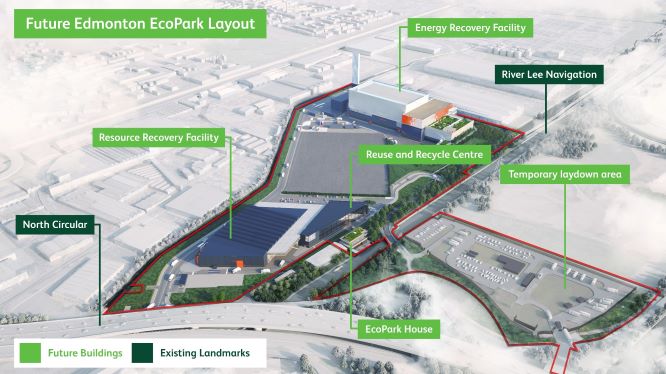Councillors give green light to facility for boosting recycling in north London
Plans to invest £100m in a new Resource Recovery Facility to boost recycling have been approved by north London councillors. The flagship Resource Recovery Facility, which is scheduled to open in 2023, is part of North London Waste Authority’s (NLWA) efforts to meet a target of at least 50% household recycling across north London.
The Resource Recovery Facility provides capacity to recycle around 135,000 tonnes of waste that would otherwise be sent to landfill, recovering thousands of tonnes of metal, plastic and wood to support north London's drive towards higher recycling rates. This facility will include an enclosed Reuse and Recycling Centre that, for the first time ever, will enable north London residents to also bring their recyclable materials directly to the Edmonton EcoPark and will add to the significant network of such centres already in place across north London, that are helping to reduce waste and improve recycling rates.
Building the Resource Recovery Facility marks the first phase of the North London Heat and Power Project (NLHPP) – NLWA's nationally significant infrastructure scheme that includes an Energy Recovery Facility to generate low-carbon heat and power from unrecyclable waste at the Edmonton EcoPark. As well as enabling north London to recycle more, the first phase of the project will also include a new education and community centre called EcoPark House, which will help local people learn about the circular economy values of reducing, reusing and recycling their waste, and in doing so reduce their impact on the environment.
The £100m contract (known as EcoPark south) being announced today for the Resource Recovery Facility and EcoPark House is a key part of delivering the NLHPP programme.
Councillor Loakes, Chair of NLWA, said: “Our investment in a state-of-the-art centre for recovering more quality recycling from the bins of north London residents at the Edmonton EcoPark, alongside a new public Reuse and Recycling Centre, is a vital part of improving the service we provide to residents. It is our duty in this time of Climate Emergency to help reduce waste, boost recycling and stop rubbish from rotting in hugely environmentally damaging landfill.”
This scheme forms a vital community asset that is part of the solution to the Climate Emergency. It will help prevent waste from over 2 million residents ending up in landfill every year. Sending that waste to landfill would generate highly damaging greenhouse gases like methane and would be significantly more expensive for local residents. The approach we are taking to managing the waste created is also consistent with the recommendations from the Committee for Climate Change to move the UK towards a Net Zero carbon economy in response to the Climate Emergency.
The Energy Recovery Facility will replace the existing plant at the Edmonton EcoPark, which is reaching the end of its operational life. This vital infrastructure scheme is expected to save the equivalent of 215,000 tonnes of carbon dioxide each year over sending waste to landfill – which is like taking 110,000 cars off the road. Consent was granted for the whole project nearly 3 years ago in February 2017. This followed a substantial and wide-reaching public consultation with residents and others. The result forms part of NLWA's commitment to providing a solution to managing residents' waste in the most sustainable way, now and in the future, as we tackle the Climate Emergency.
Using the most advanced technology to clean emissions makes the Energy Recovery Facility one of the safest and cleanest in the world. This environmentally-advanced solution mirrors that of Germany and Denmark, countries which are renowned for clean and modern facilities that treat waste in a sustainable way, as well as having substantially higher recycling rates than the UK.
Our proposals are significantly better than any alternatives among the realistic and tested technological solutions that were considered. They included mechanical biological treatment (MBT) which would need two additional processing plants and an energy recovery facility to burn the fuel created by the MBT process, increasing the carbon footprint of the waste disposal process considerably and the financial burden. They also include Materials Recovery Facilities (MRF): we already use a number of these to help delivery boroughs’ recycling rates and will continue to do so; but this is not a process for dealing with unrecyclable waste. Similarly, Anaerobic Digestion (AD) is already being used by the NLWA for dealing with the growing amounts of food waste collected separately by the boroughs, but this process also cannot treat unrecyclable waste.
Therefore, alternatives do not provide a suitable or sustainable solution for the volumes of waste that our residents are creating and that we need to treat at Edmonton EcoPark. The alternative of sending waste to landfill outside of London would generate greenhouse gases 25 times stronger than carbon dioxide, result in thousands of extra bin lorry journeys, and cost twice as much over the lifetime of the scheme.
Delivering this £100m contract for the Resource Recovery Facility and EcoPark House is an important part of the NLHPP scheme. The investment to deliver the scheme includes £600m for the Energy Recovery Facility, and £250m for the comprehensive works needed to prepare the site and deliver the project over the coming decade. Together with additional allocations for risk contingencies that experience and best practice show are necessary, this makes a total project cost estimate of £1.2bn in 2019 cash prices.
Work is already underway to prepare the site for construction and the contract for the Resource Recovery Facility and EcoPark House is the first phase of the building works. The NLHPP programme will create 100 apprenticeships and 225 on-site skills training opportunities for the local community.
Construction companies interested in bidding for the EcoPark South works to build the Resource Recovery Facility and EcoPark House can find out more here.
